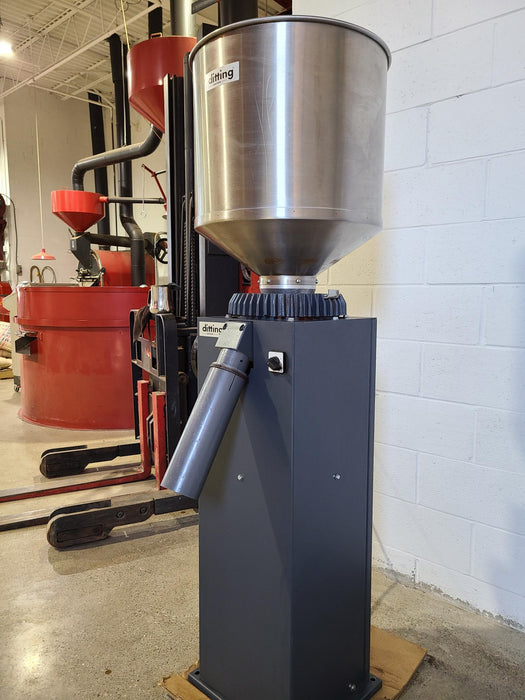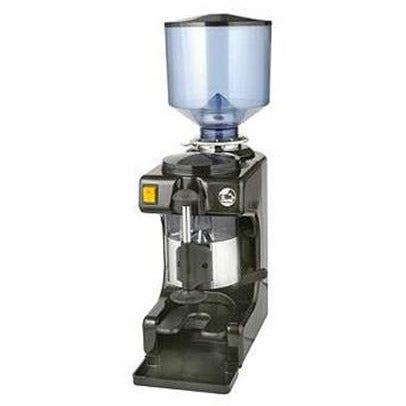Industrial Coffee Grinder Overview: Increase Efficiency and Top Quality
In the competitive landscape of coffee production, selecting the right industrial coffee grinder plays a critical function in boosting both effectiveness and item top quality. Recognizing the subtleties of numerous mill kinds and crucial attributes-- such as personalized work setups and durable building and construction-- can significantly affect the last taste account of the coffee.
Recognizing Mill Kinds
When choosing a commercial coffee grinder, understanding the various types available is essential for enhancing both taste removal and functional performance. Both primary kinds of grinders are blade grinders and burr grinders. Blade grinders use sharp blades that slice coffee beans into irregular dimensions, causing irregular removal and potentially undesirable flavors. While blade mills are usually extra cost effective and ideal for small-scale operations, they are usually not advised for industrial use.

Inevitably, choosing the best sort of mill is important to preserving top quality and effectiveness in coffee manufacturing, making it essential for organizations to purchase premium burr grinders for optimum outcomes.
Key Attributes to Consider
Choosing an industrial coffee mill requires mindful factor to consider of several vital features that can considerably affect both efficiency and the overall coffee experience. One of the main facets to evaluate is the grinding mechanism. Burr grinders are normally favored over blade mills, as they offer a constant work dimension, which is crucial for optimal extraction and taste.
Another important feature is the grinder's capability. A flexible mill with multiple settings enables you to customize the grind size to different brewing techniques, boosting the coffee's taste account.
Review the grinder's sound level, particularly in a busy coffee shop or manufacturing atmosphere, where excessive sound can be turbulent. Investing in a mill that stabilizes these functions can considerably boost both functional performance and the high quality of the coffee offered.
Optimizing Grinding Process
To achieve the best results in coffee prep work, optimizing the grinding process is necessary. The work size considerably affects removal, taste, and overall high quality of the made coffee.


In addition, monitoring the grinding speed can optimize the process. Slower grinding typically generates less heat, protecting fragile tastes and fragrances. Alternatively, faster grinding may create too much heat, negatively affecting the coffee's high quality.
Maintenance and Care Tips
Proper maintenance and treatment of commercial coffee mills are essential for ensuring optimal efficiency and longevity. Regular cleaning is the foundation of maintenance; deposit accumulation can impact flavor and grinding performance. It is suggested to cleanse the mill after each usage, cleaning down the exterior and eliminating any type of coffee grounds from the burrs.
In addition, check the grinding burrs for deterioration. Boring burrs can compromise work uniformity, so they ought to be replaced as essential. Industrial Coffee Grinder. Occasionally adjusting the grinder is also important, as this preserves the desired work dimension for different brewing methods
Lubrication of relocating components must be done according to the producer's specifications, as this lowers friction and prolongs the life of the tools. It is important to make use of food-grade lubes to guarantee security read what he said and conformity with wellness policies.
Lastly, maintain the mill in a stable and dry setting to avoid rust and corrosion. By sticking to these maintenance and treatment suggestions, drivers can boost the efficiency of their industrial coffee grinders while making sure high-quality result and extended functional life.
Return on Investment Evaluation
Assessing the return on financial investment try this out (ROI) for industrial coffee mills is crucial for services looking for to optimize their coffee production capacities. A complete ROI analysis aids figure out the financial practicality of buying high-quality grinders, enabling organizations to weigh the first prices against potential gains.
To carry out a detailed ROI analysis, organizations need to consider several crucial aspects. First, analyze the acquisition rate of the mill, consisting of installment and any kind of needed alterations to existing framework. Next off, determine operational costs, consisting of power usage, maintenance expenses, and labor performance renovations. High-performance mills commonly cause minimized grinding time and enhanced throughput, which can substantially improve productivity.
Furthermore, think about the effect on product high quality. Industrial Coffee Grinder. Superior grinders produce a more consistent grind dimension, which can boost taste profiles and consumer satisfaction, ultimately driving sales. By boosting the quality of the final item, businesses can justify higher rates, causing enhanced revenue
Verdict
In recap, a commercial coffee grinder plays an essential role in enhancing both performance and product quality within coffee manufacturing. By selecting top quality burr mills equipped with necessary features such as flexible work setups and durable building and construction, businesses can make sure optimum flavor extraction. Routine maintenance is essential for maintaining mill efficiency and making best use of customer complete satisfaction. Eventually, the calculated financial investment in a reliable grinder contributes considerably to Get the facts enhanced profits and competition in the coffee market.
In the competitive landscape of coffee manufacturing, picking the appropriate commercial coffee grinder plays a critical role in enhancing both efficiency and item top quality. The 2 main types of mills are blade mills and burr grinders. Within the burr grinder category, there are level burr mills and cone-shaped burr grinders, each with its benefits. Burr mills are typically preferred over blade mills, as they supply a consistent grind dimension, which is vital for optimum removal and flavor.
In summary, a commercial coffee mill plays a critical duty in enhancing both efficiency and item high quality within coffee production.